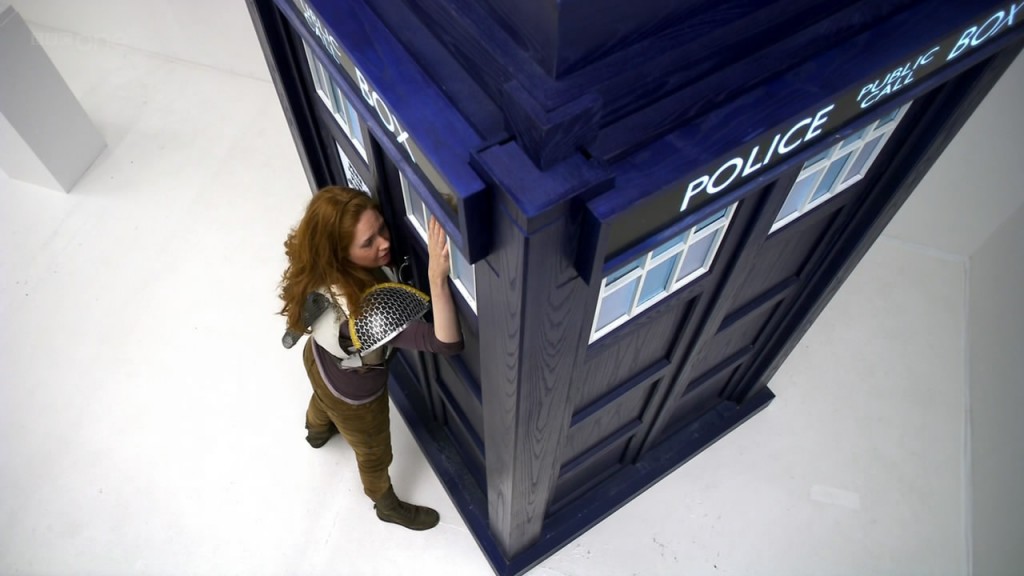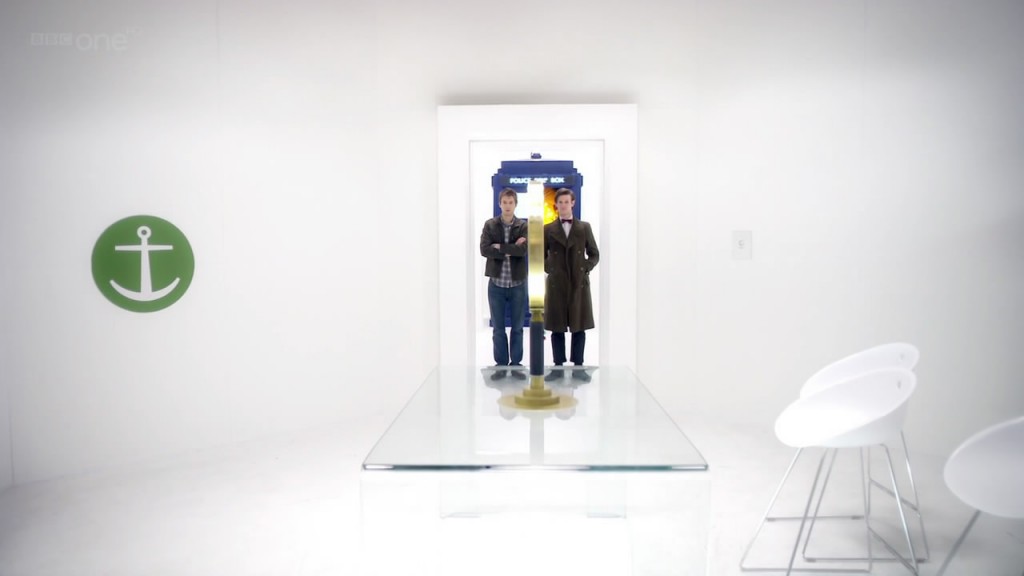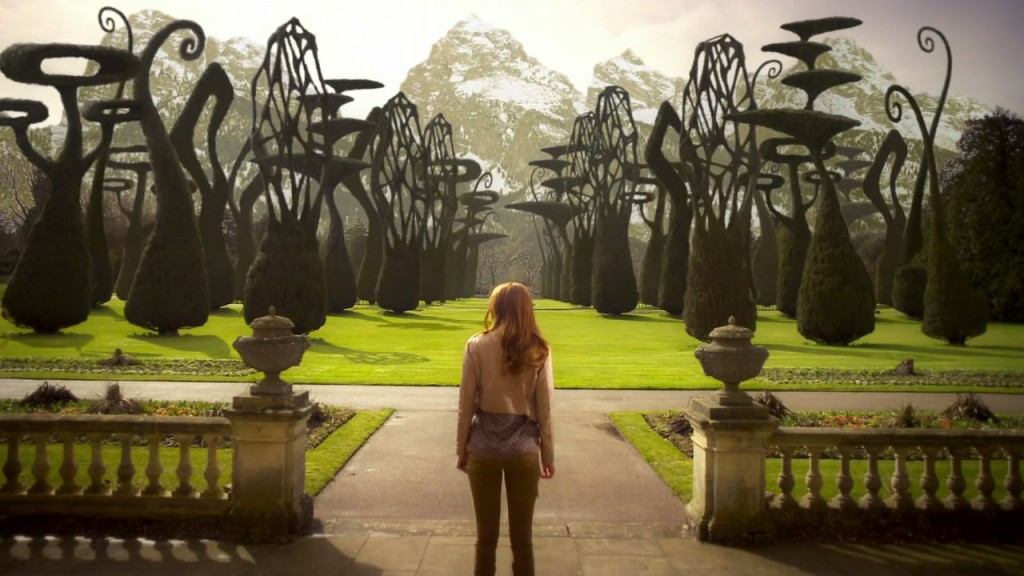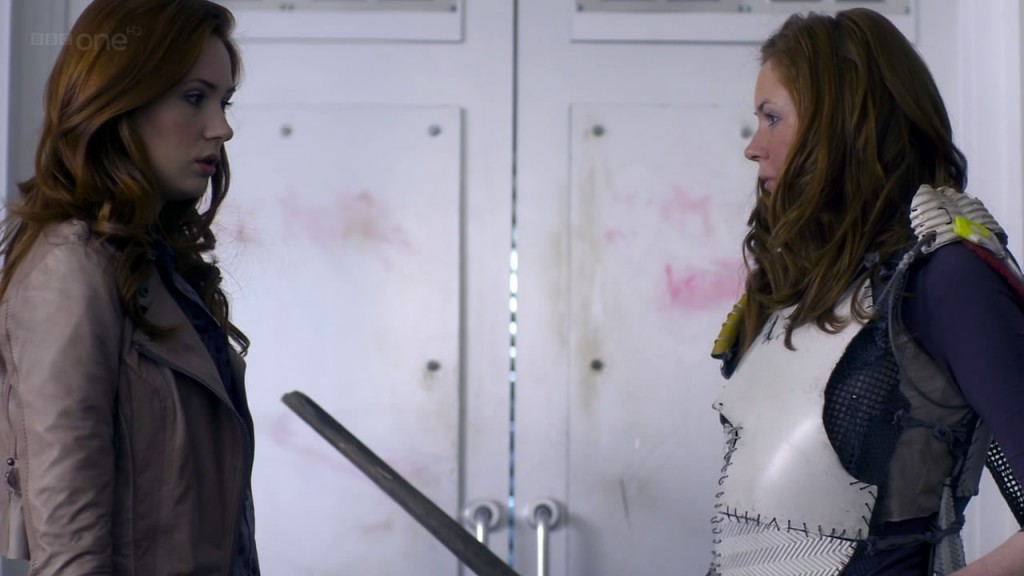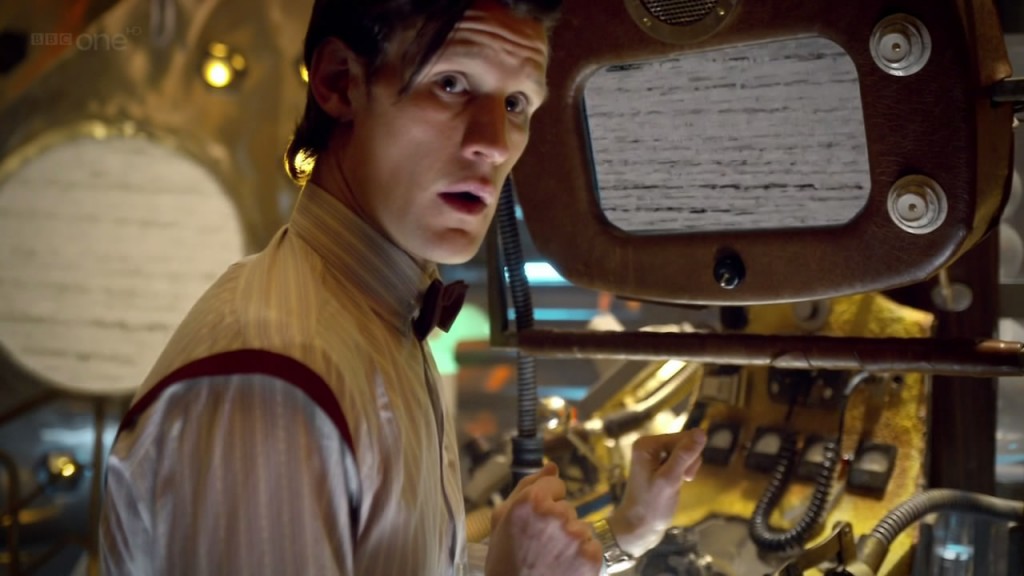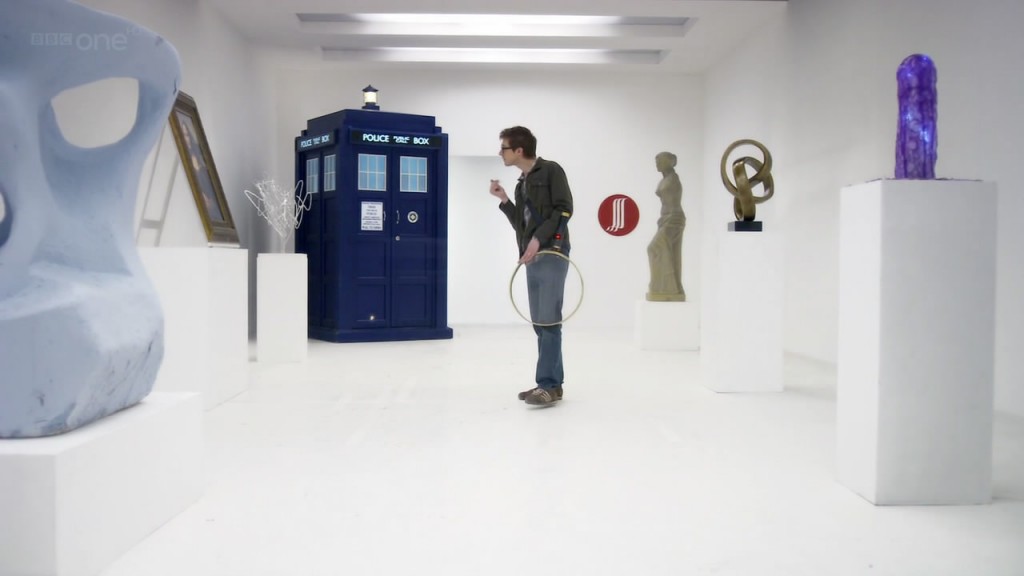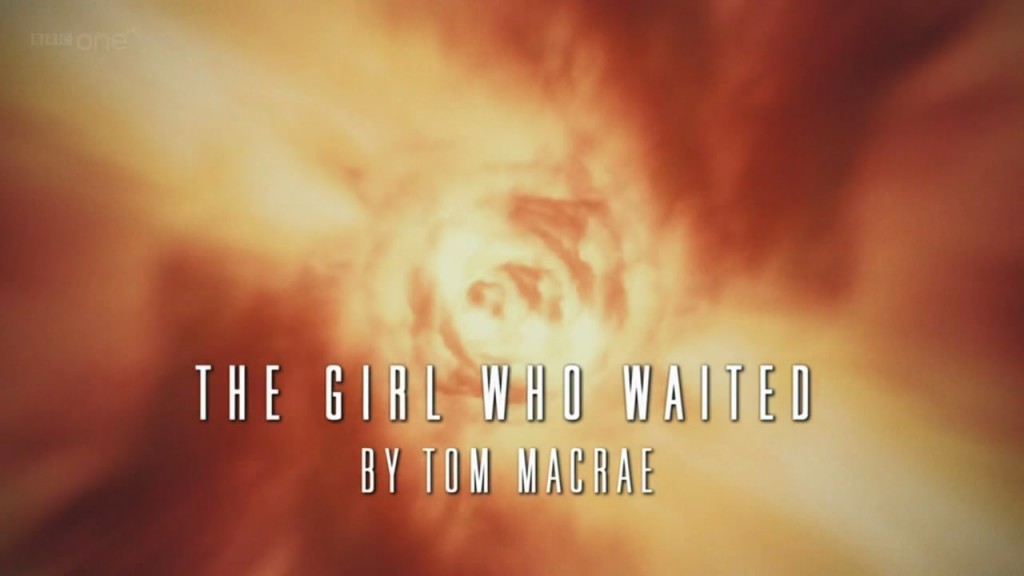
Spike: The ‘Dark Doctor’, a trope that has popped up throughout the entirety of Doctor Who in a variety of guises. From the First Doctor’s ruthless pragmatism, to the Sixth Doctor’s abrasive attitude and the Seventh Doctor’s Machiavellian scheming there has always been an element to the Doctor that was just a little nasty. The problem I’ve always had with the moments of darkness in the character, and a problem the histrionics of the new series amplified, is how overplayed this darkness was. There has never really been any shading to the nastier side of The Doctor and as such his flits into more morally questionable behaviour often feel like less an extension of the character and more a switch being flicked from ‘good’ to ‘evil’. The new season attempted to address this by positing that The Doctor used his companions as a sort of buffer from his darker impulses, they were essentially an external balance which stopped him going completely loopy and proclaiming himself God King of all Time and Space. But that never sat right with me, partially because it turned The Doctor into something of an intergalactic sociopath but mostly because this darkness was personified by moments such as The Doctor glumly standing in the rain as he drowned a space-spider.
I guess at the heart of it I just don’t believe that darkness can be personified by singular moments and it’s one of the things I’ve really appreciated about Season Six. Season Six has been building on something a little alien and mysterious about The Doctor, in fact the defining characteristic of the Eleventh Doctor seems to be that “The Doctor lies” and this notion has been germinating for the better part of two seasons now. The Eleventh Doctor isn’t particularly angsty, not in the way Ten was, or dickish, like Six, or even prone to flights of frustrated rage, like Four, he’s just kind of mysterious and withholding. That all means that his big moment this episode, slamming the door shut on Future-Amy, was shocking but also believable. That is probably the biggest discussion point of the episode, so I’ll get that out of the way first.
Did you all find that moment as shocking as I did?
Casey: I didn’t find it shocking so much as inevitable. As soon as she said she wanted to come, I knew something like that was going to happen. Although, I really did think the Doctor was going to have to bear it all. I am glad Rory had to have the moment though. It gives a companion a sense of what is like to be the Doctor. He has to make those choices sometimes. It can be a person or it can be a planet, but sometimes he has to be the one who chooses who lives and who dies. And he has been doing this for 900 plus years. It leads you down a darker view.
I was also happy Older Amy understood herself well enough to know that she would fight for her life, even if it destroyed everything around them.
And Smith sold the hell out of that scene by the way. Such a small scene, but as usual he brought it so damn well.
I have to wonder though, after this episode, how do they keep Amy and Rory after this season? So much has been building that for all the wonder and awe they have seen, they have also seen a lot of darkness and pain.
Kristina: I genuinely cannot envision a scenario in which they stay without the two of them looking like complete and utter fools. It’s one thing when there’s a single Companion in the TARDIS with The Doctor. Sure, the journey is dangerous, but there is not a voice of reason there to tell the gal to get out before it’s too late. Rory is that voice of reason, and I can’t imagine him putting up with this for much longer. As for whether or not I was shocked by The Doctor slamming the door, I have to admit that I was, but not because it was out of his character. I figured that Old Amy would die before they even made it to that point. I figured that the moment where she sees Rory carrying her younger self to safety would cause her to have a moment of realization where she allowed them to leave without her. I never thought I’d end this episode feeling truly disgusted by The Doctor. I’ve been annoyed with him before, but man, that final shot made me want to punch a hole through my TV. The act itself wasn’t shocking, but the fact that a family show is so unafraid to have its lead character look like a complete and absolute bastard sure is.
Ben: I didn’t find it shocking either, but that’s partly because it’s been consistent in Smith’s performance right from his first episode- his Doctor has always had the faint alien edge, something that hasn’t been true for all takes on the character. He doesn’t go to the lengths of Seven (who used to orchestrate the downfall of entire civilisations), but it’s a subtle part that’s really added to my appreciation of his and Moffat’s version of the character- right from the very first episodes in the 60s, The Doctor has been alien, and I think some of the recent seasons tended to forget that and just make him plain superhuman instead.
While I liked that moment, though, I found one of the reasons it stood out so much was because of the otherwise heavily sentimental tone of this week’s episode. We got off to a strong start- the visuals were striking and well-done, the different time streams concept was nicely handled, and Old Amy was surprisingly effective from both an effects and acting standpoint (Gillan was far stronger this week than she’s been in a while), but then the episode took a perfectly good resolution and proceeded to hammer it home over and over again, dumping about four times as much in the way of big closing lines as it actually needed. It seemed like the script was trying to do all the work rather than letting the actors carry it.
Against that, the Doctor’s dark moment actually felt a bit jarring, since they tried to play the scene as a heroic sacrifice simultaneously.
Spike: The one thing I loved about the scene was Amy begging Rory to not open the door, because she knew she couldn’t do the sacrifice on her own. Amy Pond, as written, isn’t exactly the kind of character who’d be into self-sacrifice. In fact her general self-interest is one of the things I like most about the character and most separates her from other companions.
Ben: Agreed, they pulled that off really well. I’d say this episode was the best showcase we’ve had for Amy this year, as she’s been pushed into the background on a fair few stories, and the whole pregnancy/flesh arc treated her as much as a plot device as it did a character.
I should probably clarify here: I didn’t think there was anything wrong with any individual scene in the latter part of the episode (and some of them, like the two Amy’s discussing beauty, were really good bits of character work), just that there were simply too many lines and moments (and slow-mo!) going over the same ground.
Spike: Yeah, they definitely over-emphasised stuff towards the end. But I think that may have been due to the overall small-scope of the episode which really didn’t feel like it filled its running time.
Like I said I just appreciate that they didn’t make things easy for Rory, and the viewers, by having Future-Amy be all noble and accepting of death.
Kristina: And that is what caught me so off-guard. They were completely setting me up for that, and then they swerved me! My anger towards The Doctor here stems from the fact that, similarly to Old Amy, I trusted The Doctor in this episode. I truly didn’t believe that The Doctor would just slam the door in her face like that. I thought we’d end with Team TARDIS a little melancholy that Old Amy had to make a noble sacrifice. And boy oh boy, that moment where The Doctor shuts his eyes and says “She’s not real” to justify his choice made me even angrier than when he actually shut the door. It was clobberin’ time in my living room after that.
Spike: Yeah, I kind of loved how apparent The Doctor was in trying to assuage the guilt he felt over that.
Casey: I was pretty happy by the way to see it be Amy this time to get used and abused and not Rory. I thought that was a nice touch. For once, Rory didn’t die or age rapidly. No more Rory as Kenny.
Spike: I thought it was cute how the entire catalyst of the episode was Rory and Amy choosing different buttons. It’s totally in Rory’s nature to pick the green, calm, button and Amy to pick the red, potentially dangerous, button.
Ben: I think I’d have appreciated the episode more if the Amy/Rory relationship wasn’t one we were already so familiar with. Taken by itself, it was an effective character piece that depicted them both well, but everything in it about the two of them was old ground- we already know that Amy loves Rory in preference to more glamorous alternatives (like the Doctor), we already know how utterly devoted Rory is, etc. The implications of Old Amy were new, and interesting, but the specific relationship between her and Rory in contrast to her younger self wasn’t something the episode pursued as much as it might.
That said, far better than Tom McCrae’s last script, which was 2006’s decidedly wonky’ Rise of the Cybermen’.
Spike: Yeah, I’m genuinely shocked that this is from the same guy who wrote that Cyberman two-parter. That was the point which completely derailed season two for me and It was only the ‘Impossible Planet’ and the surprising upswing in quality during Season 3 that kept me with the show after that. As such I was expecting the worst, although Moffat seems to have managed to get really great work out of writers whose efforts under RTD were a little anaemic.
At this rate I’m fully expecting Helen Raynor to make a triumphant return.
It’s interesting that you mention the Rory/Amy relationship because if you remember back to when we were reviewing ‘Curse of the Black Spot’ I noted how the crux of the episode was to resuscitate the Amy/Rory relationship and make it into a more equitable relationship. This episode seemed to serve a similar function, but at this point the Amy/Rory relationship is incredibly strong.
Adam: I thought the Cyberman two-parter in S2 was a fairly decent reintroduction to them, myself, but in general I thought S2 was such a misfire that it didn’t need to do much to rise above the rest.
Ben: Hey, I liked Helen Raynor’s Sontaran script (chanting aside), and I seem to be among the very few defenders of ‘Daleks in Manhattan’ (It feels exactly like old Who, with Daleks carrying out conversations among themselves and pursuing dubious scientific experiments rather than being a massive season-capping threat to all time and space). Chibnall, however, seems beyond rescuing.
Spike: I like the first episode of her Daleks two-parter and the second episode of the Sontaran two-parter, but I think both two-parter are torpedoed by one weak half.
Chibnall is an odd case in that I just don’t think he is cut out for Doctor Who. His work on Torchwood in the second season was streets ahead of the first season and it’s probably the second best run the show has had. I think his tone was just never right for Doctor Who though.
Before this becomes a massive diversion about Doctor Who in general I’m going to move onto the direction by Nick Hurran which was just fantastic. A quick glance at IMDB shows that Hurran has directed about five films, none of which I’ve actually seen. Hurran’s chops were definitely because this episode was genuinely cinematic at times. Loved stuff like the TARDIS being the only dash of colour in all white room, or the use of doors and changing sets. Even the speed-ramping at the end worked a lot better than it had any right to.
Ian: I may not have been shocked by the Doctor’s decision, but I found it very powerful and dramatic nonetheless. The decision fits his current M.O. too much to be truly jaw-dropping. But that’s not to say it wasn’t a fantastic moment. This episode built very nicely on last week’s return to weightier, less scatter-shot storytelling and it was wonderful to see the very capable Karen Gillan reminding everyone she can do more than beguile us with her beauty and cry for rescue.
It’s fitting that the Doctor is never really a background, B-story character, even when he essentially is. This is an Amy and Rory episode first and foremost, yet it’s the captain of the ship, not either companion, who provides the main talking point once again. I love the way the Doctor seems so defeated and perturbed by the situation for most of the episode, only for us to learn once again that he’s never to be underestimated. It’s credit to Smith and the script for pulling the wool over our eyes when we really ought to know better.
Other obvious positives this week, aside from the universally strong performances, were the impressive SFX and scale of the story-world. Whether it be the little Paranoid Android type fellas or the loopy sights on show in Tim Burton Gardens, there was a level of production design on show that I feel we haven’t seen a great deal of this season (with the obvious exceptions of ‘The Doctor’s Wife’ and ‘A Good Man….’)
As for negatives, again I found Rory being written around the requirements of the episode rather than treated as a person with his own thoughts and desires. By this stage, we’ve already established that he’s not the kind of guy who’s going to almost dump his cargo at the sight of a 4 foot nothing robot who might as well have walked out of an Apple advert. The man told a bunch of Cybermen where to go for crying out loud! His lazy cowardice didn’t fly with me last week during Dollgate and it’s not going to fly today.
That said, Darvill really made the most of the sombre character beats in the final stretch. Obviously, Smith is going to get all the plaudits. He’s the star striker. And Strikers always get the headlines when they’re firing, but if it was the strongest performer as opposed to the person doing the most glamorous job, the majority of plaudits would be Darvill’s. Even over Gillan, I think. He probably had the least amount of time (and dialogue) to hit his big emotional marks, yet he easily matched, if not surpassed, the others. If you think I’m getting carried away, I refer you to Rory’s “you’re turning me into you” line.
Adam: I disagree about this season not looking nice. I actually think this has been probably the best season from a production design point of view, partially because there’s been no CGI monsters and partly because it just looks slick. But this episode is definitely an even bigger jump up in the design department.
As for Dark Doctor, this episode makes it increasingly clear that the season is about dealing with the ramifications of the Doctor being a villain from a certain point of view–almost becoming “The Time Lord Triumphant” that Tennant threatened without really meaning to. I was disappointed in ‘Let’s Kill Hitler’ when they raised the spectre of the Doctor being one of history’s greatest monsters, then quickly deflected it onto River Song (although, look who’s doing the deflecting–a bunch of tiny judgmental psychos). But here we’re once again acknowledging that the Doctor’s actions have a lot of negative consequences–Rory’s accusation that they could have avoided this by cracking a history book was bang on, and the Doctor’s “I don’t travel that way” was a weak rejoinder.
To me part of the show’s essential premise is that you’ve got a guy who’s kind and compassionate to individuals, but often wreaks havoc in the big picture–who knows how saving someone’s life in a certain historical period might resonate with history? It’s the classic idea that the child whose life you save may grow up to be the next Genghis Khan…just last week the Doctor saved a child who fits that profile exactly. He epitomizes the idea that one death is a tragedy, a million is a statistic. And I like that the writers are overtly dealing with that. It’s clearer and clearer to me that this is something that the show is planning to confront somehow.
Ian: I never said this season hasn’t looked nice, Adam. There hasn’t been a bad-looking one in the bunch. I just feel that this episode and the two others I mentioned are obviously more impressive in that regard than the rest of them. And if I’m being really honest, only ‘The Doctor’s Wife’ offers something not only superior to, but also noticeably different from the visual highlights of last season. It’s not all about the grandeur or the scale of the thing. I found the sojourn into the country with Van Gogh a more beautiful episode than the majority of this season. And it’s not like an episode such as ‘A Good Man…’ really takes something like “The Pandorica Opens” to another level. It looked very nice, no doubt. But is it really a massive step forward? Does it improve that type of backdrop radically? I’m not convinced it does. At least with an episode like this, it gives a chance to side-step the occasionally ropey CG by making the most of more practical means (which, for me, are always preferable.)
Adam: Right, which is why I like this season better. 🙂 But no argument that the Smith years have been a huge leap forward in visual style from the cheesy Tennant years. I just think the production has been of a higher quality in general this season (don’t forget how great the ‘Day of the Moon’ two parter looked, either) with fewer awkward sets and fake CGI critters. It’s not necessarily about dazzling, Tim Burton art design. But arguing about S5 vs. S6 is splitting hairs, to me–they’re both immensely more cinematic than the previous seasons.
Spike: Just to add, I think the main difference between Season Five and Season Six is that Season Six has limited it’s locations a little more than Five. Episodes in Season Five felt like they moved around a lot more, whilst episodes in Season Six seem to be centred around three or four primary sets. But both seasons are really cinematic and I think Season Six has been far more consistent in ‘look’ than Season Five which flitted between the fairy-tale aesthetic of the Moffat episodes and the look of the previous season.
Adam: I think ‘The Impossible Astronaut’/’Day of the Moon’ is almost unquestionably the most cinematic and slick pair of episodes the show’s ever produced, and only The Curse of the Low-Budget Pirates looked outright clunky this season, compared to some unconvincing locations in episodes like ‘The Beast Below’ and the Silurian two-parter. But again, I’m probably splitting hairs.
But anyway, back to Dark Doctor. I think one of the things that fans have been annoyed about of late is the way the Doctor’s immorality has been coming out, which, as I say, seems completely intentional at this point. There seem to be a lot of fans who see the Doctor as a standard-bearer for a certain set of political ideals. I have to admit that the Doctor is probably the most prominent genre character who can be unequivocally lumped in with the political, or at least social, left–most other action heroes have a bit of an implicit conservative streak to them, solving problems with force and maintaining the status quo. The Doctor is overtly anti-authoritarian, pacifist, and tends to embrace that which is different (though that last bit varies wildly, as I’ve discussed in the past–sometimes evil monsters are evil, sometimes they’re misunderstood). I certainly think the fact that the villains are so often technology gone wrong while attempting to fix things, as we see again in this episode, speaks to a certain generosity of spirit in the Whoniverse. So when you get the Doctor committing acts of genocide, or, more shockingly in this episode, making a hard choice to betray someone to their face (whereas the Doctor is usually able to fly away and avoid consequences), I think a lot of people see it as a betrayal. I think that’s where a lot of the negative feelings about this season are coming from out in Who fandom.
Spike: There’s also the fact that Who has such a wide fan base now, who all jumped on at different points and view their inception point as the ‘true’ spirit of Who, that it is impossible to please everyone. My first experience with Doctor Who was with the Fourth Doctor omnibuses on UK Gold and as such I tend to find overtly ‘gothic horror’ episodes to be closer to my view of traditional Who, whilst people raised on the Third, Fifth, Sixth or who joined with RTD might have completely different ideas.
Ian: I wasn’t just talking about CG monsters before, Adam. I was talking about CG full stop. As I said, the focus of this episode might have lent itself well to dodging that gripe, but it’s not like the show has lost its CG problems along with the abundance of CG monsters (hello, ‘gangers.) There have still been plenty of occasions when the limitations of this show have become apparent so we’ll just have to agree to disagree about the production design stuff. There may have been a few moments so far that have taken it up a notch from what we had last series, but I don’t think it’s been particularly uniform. If it had, I don’t think we’d have seen things like the still quite ropey CG when River fell out of the building early on to evade capture or her regenerationpolooza a few weeks ago. This kind of thing seems to have supplanted the odd dodgy monster without really fixing the same basic believability problem. The recycling of establishing shots on alien worlds from last year (see ‘A Good Man…’ again) is another sign things haven’t progressed too much.
This week showed the good and bad side of where it’s at in that department. An example of the good might be the bowels of the complex where Old Amy was holing up out of sight with Rory the Robot. The work in that dark corridor with the machinery wouldn’t look out of place inside J.J. Abrams’ noisy Enterprise; the flip-side to that being the odd barely disguised set – witness the welcome area Amy was greeted with this time. Granted, some of this may have been deliberate, but it literally might as well have been any airport check in terminal with the airline signs covered over.
Spike: It probably WAS an airline terminal with the signs covered over. Without trying to make excuses for the show it does have an incredibly tight budget for what it sets out to do. From what I understand they splurged with certain episodes last year and had to really cut back on other episodes to keep within budget, they seem to being a little more careful this year.
But the constraints aren’t just budget related, there’s a ton of stuff about the production of Doctor Who that limit what they can do. I mean this episode was the Doctor-lite episode of Season Six which was done so Matt Smith would have the time to film ‘A Christmas Carol’, and that’s why Amy and Rory have such a minimal presence in that episode.
Ian: I don’t want to sound too scathing about that because I appreciate how fine a job they do working with what they have. It just strikes me on occasion how something as innocuous as a shaft of light in a roof can almost suck me out of an episode.
Kristina: I wanted to ask you guys what you thought of the complete lack of a mention of Melody in this episode. I know that there’s really nothing that they can do about the Melody situation, but it just feels unnatural to me that Amy and Rory would not be in some way affected by the loss of their child. I keep thinking about ‘A Good Man Goes To War’ and that heart-breaking moment where Amy screamed as the baby turned to yogurt, about how Amy was so distraught that she aimed a gun at River, about how the first thing she asked The Doctor in “Let’s Kill Hitler” was about her kid. It just feels weird that Amy’s all “Where’s my camera phone?” when her kid is out there. Now, I’m not suggesting that they bring things to a total halt every episode to have a “Melody moment”, but the fact that they appear to not give a single thought toward their child is off. I don’t care if they grew up with her in the form of Mels. That is not the same thing as raising a child, seeing which one of them she favors in looks and temperament (hell, they’ll never know what she would have looked like without the regenerations), and going through the trials of parenthood together as a couple. That has been stolen from them. And when they return home, if they have more kids, how will Amy and Rory explain to those kids where their big sister is? There’s always going to be an empty seat at the kitchen table. I cannot see a couple not being at least a little bothered by that. I guess the burden is lessened since they know she’ll be okay, but I don’t like how the show is handling this situation so far.
Adam: It’s an inevitable consequence of how this show is filmed. They don’t seem to have the machinery to handle true on-going storylines. In the past, I’ve praised Doctor Who for being able to do great standalone stories, something that’s been missing from TV for a while, but here’s where you get the downside of that, with multiple writers and episodes getting moved around.
That being said, it IS a bizarre situation that they’re in–almost as soon as Melody was taken, they were suddenly given proof that she’d grow up to be River, and that things would end up OK. Likewise in ‘Let’s Kill Hitler’, with Mels. Of course there’s still the raw emotional pain of losing your baby, but even there, remember, Amy went through an incredibly compressed pregnancy as far as she was concerned. She suddenly found out she was definitely pregnant right as she was giving birth. She and Rory have literally had no time to go through the traditional process of getting pregnant, watching the baby grow, giving birth, watching the early development, etc. It’s all been sprung on them, and wrapped up with a lot of crazy and traumatic SF events as well. So I’m prepared to accept the idea that they’re running on fumes at this point, desperately leaping around the universe and trying to lose themselves in adventure so they don’t have to deal with the emotional OR the intellectual craziness. If there’s an episode near the end where it all hits home and the Pond-Williamses go a little insane from everything they’ve been through, I’ll at least accept it on TV terms, if not “realistic” ones.
Ian: I think you’ve raised a very good point there, Kristina. All those little nods in the first half of the season to the overall journey – like Eyepatch Woman – never felt entirely assured to me. Whenever this has happened so far, it’s felt like a screenwriter using voice over as connective narrative tissue. Instead of finding a neat way of keeping the pot ticking over, they’ve basically bunged a mention of something in here and there, as though it were ticking a box. What you’re talking about Kristina, that run-on of consequences and themes (or lack of) between episodes is very much in the same ballpark. I was so engrossed in this episode that I wasn’t particularly worried about it in the moment, but upon reflection, there really isn’t the ideal balance here between Amy and Rory as characters in the “companion roles” and as parents.
I’m not for one second saying I’d like to have after-school special style digressions where we see the young couple wade through the emotional murkiness that comes with time hopping (“tonight… on a very special Doctor Who….”) I just wish it didn’t feel like I’m making excuses for the show if I think “well, they probably do a lot of that off-screen.” Again, I appreciate that there’s a mammoth juggling act required with a family show such as this. The kids aren’t going to want to sit through weekly Ken Loach / Mike Leigh in Space style scenes where this kind of “grown-up” milieu comes into play – though I would – so it has to be handled very delicately.
It is possible to do this sort of thing without derailing the whole operation though. Deep Space Nine managed to sustain a palpable sense of dread in its later seasons during the massive “Dominion War arc” so that, even in the standalone episodes designed to provide a respite from all the combat, we never forgot the bigger picture. Sometimes all that would take would be a well-placed line or two. Maybe a scene at the start where somebody handed in a casualty report. And that would be enough. We know where we stand. The audience knows that the writer/s know where the characters stand. On with the show.
Part of this might just be a case of square peg and round whole, in the kindest possible way. There was a feature in Empire about Doctor Who a few issues back. One of the most interesting points raised was how the show feels increasingly Americanized with its slick pacing, visuals, and season-spanning story-lines. This was something I’d already thought about following the last series – and I know there’s a big difference between looking back on a run that’s finished and talking about one still in progress – but, so far, this series is making me think Moffat et al might still have some teething issues to work through before they’re really firing with this epic approach the way they want to be.
Spike: I think the biggest issue I have with the overarching storyline is that on one hand it’s easy to relate to the concept of the Melody storyline, grieving parents wanting their kid back, but there are so many caveats and diversions that it’s almost impossible to conceptualise. At the moment Amy and Rory are missing a kid they’ve know about for a month or so, who grew up with them, who then turned into River Song whose role within the TARDIS crew has been almost like a parental figure.
As such you’re left wondering if it is even possible for them to reconcile with their child now, and the show doesn’t seem to want to address the questions those particular circumstances raise. In fact the show seems to think it has resolved that plotline, with the main story-arc now being the Doctor’s death on the shores of Lake Silencio. I assume that this is all going to get wrapped up at the end but I’ve got a really, really, really, bad feeling we’re heading towards an alternate reality/diverted timelines resolution.
Ian: I’m really glad to hear I’m not the only one saying things like “the show seems to think.” I’ve not wanted to sound like I’m going after Moffat or anything, but I keep coming back to this feeling that I should be thrilling to things which are only registering with me. If these big moments or narrative strands are going to have the desired impact, they need to be earned and connected exquisitely to everything around them. And I hate to say it but it’s seemed rather muddled to me too at times.
Spike: Here’s the thing, the show seems to be building up a tension between The Doctor and Amy/Rory, so I don’t understand why the conflict can’t come from The Doctor dragging Amy and Rory around the universe whilst they just want to find their kid. Just establish how annoyed they are at his cavalier attitude at the start of the episode and have the Doctor to be evasive and you can maintain your growing rift and nurture the Melody Song plot line.
Then again maybe overarching plotlines mean that we can’t see the forest for the trees. I remember when Supernatural was getting flack in its Fourth and Fifth seasons for having standalone episodes which didn’t move the overall narrative forwards.
Ian: I don’t watch Supernatural, but I take your point. We’re certainly learning things about these people as we’re going and the show definitely doesn’t like to hang about. So it’s not like it’s going backward or rehashing last season. Although there’s maybe the case with the central character dynamics that, as I feel with the production design, it’s not taking huge strides forward. Things have changed, yet the lay of the land doesn’t feel terribly different from how it did last season. If someone stopped watching the last series before it finished and started catching up with this episode, it’d be interesting to see if they felt a profound shift. Obviously there are episode-specific examples where the differences on the TARDIS are more marked than others, but the very fact that we’re talking about these discrepancies says a lot.
Adam: Something else to consider: I believe all this overarching plot stuff with Demon’s Run and River Song is intended as a metaphor for Amy and Rory’s concerns about becoming parents, which ties into last season’s themes of growing up and leaving childhood behind. Again, the fact that Amy was going to be a parent can’t really have registered much before all hell broke loose, so in a sense she and Rory are still in the mind-set of learning that they’re pregnant. Which means the honeymoon is well and truly over. Last season seemed to have Amy putting off her adulthood for just a bit longer, now we’re reaching the point, arguably, where clinging to one’s childhood is becoming a foolhardy thing to do. And I think it’s worth noting that this episode has Amy confronting an older version of herself, just as she spent time with a younger version last season. So while it doesn’t excuse the inconsistent characterization, I think that you can see Amy as pulling a Scarlett O’Hara here–”Fiddle-dee-dee, I shall think about it tomorrow, tomorrow is another day.” It’s possible that all the temporal and emotional madness will catch up to her and coincide with the idea that she’s going to have to leave the TARDIS and settle down with Rory a la “Amy’s Choice”. The idea that Amy might actually be feeling a bit of relief that she’s not going to have to be a parent is something that I’d definitely like to see explored.
Spike: That’s a great interpretation, I’ll be sad if that’s NOT the case. Although I find myself agreeing with Kristina that this is starting to feel like the end of Rory and Amy as companions, I think they’ve outgrown The Doctor at this point. Which actually is a compliment to the show, that these two tertiary characters have grown so much.
Adam: Well, watching Amy grow up and realize she has to leave the Doctor, representing her childhood, behind, is a fairly logical conclusion to this season. (Rory is probably happy to settle down with Amy, and since we’re now seeing hints of antagonism between him and the Doctor, it’s probably not much of a choice for him.)
Spike: On a sartorial note, am I the only one bothered by how the Doctor seems to be alternating between two very different looks between episodes. In ‘Let’s Kill Hitler’ and ‘The Girl Who…’ he’s got his new long coat and white shirt, in ‘Night Terrors’ and the preview for next week he’s got his coloured checked shirt and his usual suede jacket. Seems odd that they’re flitting between the two styles seemingly at random with no rhyme or reason.
Kristina: This guy’s fashion sense has had neither rhyme nor reason since Season Five, so I don’t mind that at all. I’m much more interested in seeing if and how next week’s episode builds upon the growing tension between The Doctor and his companions.
Spike: Toby Whithouse, as much as I love Being Human, tends to write romps for Doctor Who so I’m not expecting anything particularly revelatory. Then again I loved this episode and it was written by the guy who made a lifelong Cybermen fan hate Cybermen, so you never know what can happen. You’re probably right about his change in clothes just being about the Doctor’s personality rather than for any specific plot reasons.
Casey: I can’t but help wonder if there isn’t something with the coat like last season with coat on/coat off. And the Catholic School kid in me prefers the regular dress coat look.
I still keep coming back to The Doctor saying, “That’s not how I travel.”
Spike: I do think that line might prove to be important Casey; it seems to be the main point of conflict between The Doctor and Rory. This is all proving to be very interesting because in the New Season we’ve never had a companion outgrow the Doctor. I guess you could argue that Martha decided to leave, but that really wasn’t built up throughout the season. I’m hoping as the season moves towards its conclusion we see some movement towards that plotline.
